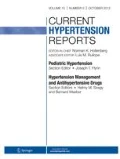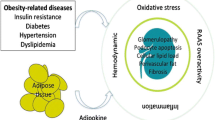Abstract
Several epidemiologic investigations have confirmed that obesity is a significant risk factor for the appearance of proteinuria and end-stage kidney disease in a normal population. Weight loss induced by low-calorie diets, physical exercise, or bariatric surgery is accompanied by an important antiproteinuric effect. Reduction in proteinuria is already observed after a few weeks from the onset of weight loss and it is evident even in patients with modest weight losses. Reduction in proteinuria by weight loss has been described in chronic proteinuric nephropathies of different etiologies. The mechanisms through which weight loss may reverse proteinuria are likely to be plural: better control of blood pressure, improvement of serum lipid profile, improvement of insulin sensitivity, better glycemic control in diabetes patients, decrease of circulating leptin levels, reversal of glomerular hyperfiltration, and decreased activation of the renin-angiotensin-aldosterone system.
Similar content being viewed by others
References
Papers of particular interest, published recently, have been highlighted as: • Of importance •• Of major importance
Weisinger JR, Kempson RL, Eldridge FL, Swenson RS. The nephrotic syndrome: A complication of massive obesity. Ann Intern Med. 1974;81:440–7.
Verani RR. Obesity-related focal segmental glomerulosclerosis: pathological features of the lesions and relationship with cardiomegaly and hyperlipidemia. Am J Kidney Dis. 1992;20:629–34.
Kambham N, Markowitz G, Valeri AM, et al. Obesity-related glomerulopathy: an emerging epidemic. Kidney Int. 2001;59:1498–509.
Fox CS, Larson MG, Leip EP, et al. Predictors of new-onset kidney disease in a community-based population. JAMA. 2004;291:844–50.
Must A, Spadano J, Coakley EH, et al. The disease burden associated with overweight and obesity. JAMA. 1999;282:1523–9.
Hsu CY, McCulloch CE, Iribarren C, et al. Body mass index and risk for end-stage renal disease. Ann Intern Med. 2006;144:21–8.
Gelber RP, Kurth T, Kausz AT, et al. Association between body mass index and CKD in apparently healthy men. Am J Kidney Dis. 2005;46:871–80.
• Munkhaugen J, Ludersen S, Wideroe TE, Hallan S. Prehypertension, obesity, and risk of kidney disease: 20 year follow-up of the HUNT I study in Norway. Am J Kidney Dis. 2009;54:638–646. Among 75,000 adults followed over 21 years, increased BMI dramatically correlated with initiation of renal replacement or death with CKD. Prehypertension adversely affected outcome only in those with obesity.
Praga M. Obesity: a neglected culprit in renal disease. Nephrol Dial Transplant. 2002;17:1157–9.
Kasiske BL, Napier J. Glomerular sclerosis in patients with massive obesity. Am J Nephrol. 1985;5:45–50.
Praga M, Hernández E, Morales E, et al. Clinical features and long term outcome of obesity-related focal segmental glomerulosclerosis. Nephrol Dial Transplant. 2001;16:1790–8.
Adelman RD, Restaino IG, Alon US, Blowey DL. Proteinuria and focal segmental glomerulosclerosis in severely obese adolescents. J Pediatr. 2001;138:481–5.
Praga M, Morales E, Herrero JC, et al. Disminución de masa renal funcionante y proteinuria. Nefrología. 1998;18:17–22.
Praga M, Bornstein B, Andrés A, et al. Nephrotic proteinuria without hypoalbuminemia: clinical characteristics and response to angiotensin-converting enzyme inhibition. Am J Kidney Dis. 1991;17:330–8.
Praga M, Morales E, Herrero JC, et al. Absence of hypoalbuminemia despite massive proteinuria in focal segmental glomerulosclerosis secondary to hyperfiltration. Am J Kidney Dis. 1999;33:52–8.
D’Agati V. The many masks of focal segmental glomerulosclerosis. Kidney Int. 1994;46:1223–41.
Praga M, Morales E. Obesity, proteinuria and progression of renal failure. Curr Opin Nephrol Hypertens. 2006;15:481–6.
•• Afshinnia F, Wilt TJ, Duval S et al. Weight loss and proteinuria: systematic review of clinical trials and comparative cohorts. Nephrol Dial Transplant. 2010;25:1173–1183. Evidence supports the beneficial effect of weight loss on the surrogate outcomes of the decrease of urinary protein excretion. There are no data on the effect of weight loss on the progression to CKD.
•• Navaneethan SD, Yehnert H, Moustarah F et al. Weight loss interventions in chronic kidney disease: a systematic review and meta-analysis. Clin J Am Soc Nephrol. 2009;4:1565–1574. This systematic review demonstrated that weight loss may offer renal benefits in addition to cardiovascular benefits. The evidence supporting the role of intentional weight loss in slowing the progression of kidney disease in patients with mild to moderate CKD is modest.
Vasquez B, Flock EV, Savage PV, et al. Sustained reduction of proteinuria in type 2 (non-insulin-dependent) diabetes following diet-induced reduction of hyperglycaemia. Diabetologia. 1984;26:127–33.
Solerte SB, Fioravanti M, Schifino N, et al. Effects of diet-therapy on urinary protein excretion albuminuria and renal haemodynamic function in obese diabetic patients with overt nephropathy. Int J Obes. 1989;13:203–11.
Saiki A, Nagayama D, Ohhira M, et al. Effect of weight loss using formula diet on renal function in obese patients with diabetic nephropathy. Int J Obesity (Lond). 2005;29:1115–20.
Praga M, Hernández E, Andres A, et al. Effects of body-weight loss and captopril treatment on obesity-related proteinuria. Nephron. 1995;70:35–41.
Morales E, Valero MA, León M, et al. Beneficial effects of weight loss in overweight patients with chronic proteinuric nephropathies. Am J Kidney Dis. 2003;41:319–27.
• Friedman AN, Yu Z, Juliar BE, et al. Independent influence of dietary protein in markers of kidney function and disease in obesity. Kidney Int. 2010;78:693–697. In this study, 17 obese patients were randomly enrolled in a doubled-blind crossover design to receive a high-protein diet for 1 week, followed by a washout period, followed by a low-protein diet for 1 week. The authors concluded that dietary protein is unlikely to explain obesity-related elevations in GFR and proteinuria.
Brolin RE. Bariatric surgery and long-term control of morbid obesity. JAMA. 2002;288:2793–6.
Soto FC, Higa-Sansone G, Copley JB, et al. Renal failure, glomerulonephritis and morbid obesity: improvement after rapid weight loss following laparoscopic gastric bypass. Obes Surg. 2005;15:137–40.
Izzedine H, Coupaye M, Reach I, Deray G. Gastric bypass and resolution of proteinuria in obese diabetic patient. Diabetes Med. 2005;22:1761–2.
Palomar R, Fernández-Fresnedo G, Dominguez-Diez A, et al. Effects of weight loss after biliopancreatic diversion on metabolism and cardiovascular profile. Obes Surg. 2005;15:794–8.
Agrawal V, Khan I, Rai B, et al. The effect of weight loss after bariatric surgery on albuminuria. Clin Nephrol. 2008;70:194–202.
Yanovski SZ, Yanosvski JA. Obesity. N Eng J Med. 2002;346:591–602.
Wadden TA, Berkowitz RI, Womble LG, et al. Randomized trial of lifestyle modification and pharmacotherapy for obesity. N Engl J Med. 2005;353:2111–20.
Despres JP, Golay A, Sjöström L. Effects of rimonabant on metabolic risk factors in overweight patients with dyslipidemia. N Engl J Med. 2005;353:2121–34.
Wolf G, Hamann A, Han DC, et al. Leptin stimulates proliferation and TGF-beta expression in renal glomerular endothelial cells: potential role in glomerulosclerosis. Kidney Int. 1999;56:860–72.
Chagnac A, Weinstein T, Herman M, et al. The effects of weight loss on renal function in patients with severe obesity. J Am Soc Nephrol. 2003;14:1480–6.
Engeli S, Bohnke J, Gorzelniak K, et al. Weight loss and the renin-angiotensin-aldosterone system. Hypertension. 2005;45:356–62.
Praga M, Morales E. Obesity-related renal damage: changing diet to avoid progression. Kidney Int. 2010;78:633–5.
•• Iglesias P, Díez JJ. Adipose tissue in renal disease: clinical significance and prognostic implications. Nephrol Dial Transplant. 2010;25:2066–2077. This review of the clinical and experimental data supports a key role of adipose tissue in renal disease. The kidney plays an important role in the regulation of adipokines that may contribute to increases in uremia-associated risk of cardiovascular disease and mortality.
• Ix JH, Sharma K. Mechanisms linking obesity, chronic kidney disease, and fatty liver disease; the roles of fetuin-A, adiponectin, and AMPK. J Am Soc Nephrol. 2010;21:406–412. This review shows that lower adiponectin and higher fetuin-A serum levels are associated with obesity, metabolic syndrome, and albuminuria.
Hall JE, Brandy MW, Henegar JR, Shek EW. Abnormal kidney function as a cause and a consequence of obesity hypertension. Clin Exp Pharmacol Physiol. 1998;25:58–64.
Chagnac A, Weinstein T, Korzets A. et al: Glomerular hemodynamics in severe obesity. Am J Physiol. 2000;278:F817–22.
Bickel CA, Verbalis JG, Knepper MA, Ecelbarger CA. Increased renal Na-K-ATPase, NCC, and beta-ENaC abundance in obese Zucker rats. Am J Physiol Renal Physiol. 2001;281:F639–648.
González E, Gutierrez E, Morales E, et al. Factors influencing the progresión of renal damage in patients with unilateral renal agenesis and remmant kidney. Kidney Int. 2005;68:263–70.
Jafar TH, Schmid CH, Landa M, et al. Angiotensin-converting enzyme inhibitors and progression of nondiabetic renal disease. A meta-analysis of patient-level data. Ann Intern Med. 2001;135:73–87.
Hall JE. The kidney, hypertension and obesity. Hypertension. 2003;41:625–33.
El-Atat FA, Stas SN, McFarlane SI, Sowers JR. The relationship between hyperinsulinemia, hypertension and progressive renal disease. J Am Soc Nephrol. 2004;15:2816–27.
• Hunley TE, Ma LJ, Kon V. Scope and mechanisms of obesity-related renal disease. Curr Opin Nephrol Hypertens. 2010;19:227–234. Experimental and clinical studies reveal that adipose tissue, especially visceral fat, is a source of bioactive substances that contribute to pathophysiologic renal hemodynamic and structural changes leading to obesity-related nephropathy.
De Paula RB, Da Silva AA, Hall JE. Aldosterone antagonism attenuates obesity-induced hypertension and glomerular hyperfiltration. Hypertension. 2004;43:41–7.
• Bomback A, Klemmer PJ. Interaction of aldosterone and extracellular volume in the pathogenesis of obesity-related kidney disease: a narrative review. Am J Nephrol. 2009;30:140–146. This review suggests that elevated aldosterone levels and expanded extracellular volume are key components of obesity-induced renal disease via aldosterone’s nonepithelial effects on the kidney.
Hostetter TH, Ibrahim M. Aldosterone in chronic kidney and cardiac disease. J Am Soc Nephrol. 2003;14:2395–401.
Morales E, Huerta A, Gutierrez E, et al. The antiproteinuric effect of the blockage of the renin-angiotensin-aldosterone system (RAAS) in obese patients. Which treatment option is the most effective? Nefrologia. 2009;29:421–9.
Acknowledgments
This paper was partially supported by grants from Fondo de Investigaciones Sanitarias (FIS 10/02668) to MP and Asociación para la Investigación y Tratamiento de las Enfermedades Renales (AITER) to EM.
Disclosure
Conflicts of Interest: E. Morales: Consultancy fees from Novartis, Roche, Celgene; payment for lectures from Novartis, Shire, Abbott, Amgen. M. Praga: Consultancy fees from Novartis, Roche, Astellas, Fresenius, Gambro, Abbott; payment for lectures from Novartis, Astellas, Abbott.
Author information
Authors and Affiliations
Corresponding authors
Rights and permissions
About this article
Cite this article
Morales, E., Praga, M. The Effect of Weight Loss in Obesity and Chronic Kidney Disease. Curr Hypertens Rep 14, 170–176 (2012). https://doi.org/10.1007/s11906-012-0247-x
Published:
Issue Date:
DOI: https://doi.org/10.1007/s11906-012-0247-x




